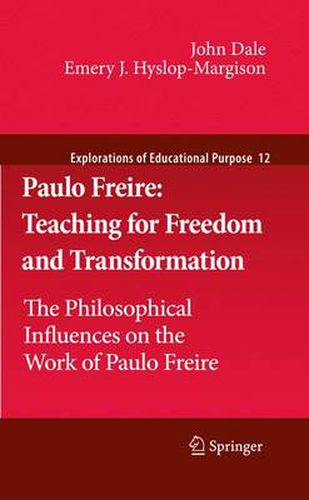Readings Newsletter
Become a Readings Member to make your shopping experience even easier.
Sign in or sign up for free!
You’re not far away from qualifying for FREE standard shipping within Australia
You’ve qualified for FREE standard shipping within Australia
The cart is loading…






This title is printed to order. This book may have been self-published. If so, we cannot guarantee the quality of the content. In the main most books will have gone through the editing process however some may not. We therefore suggest that you be aware of this before ordering this book. If in doubt check either the author or publisher’s details as we are unable to accept any returns unless they are faulty. Please contact us if you have any questions.
The primary mission of this text is clarifying many of the misconceptions about Paulo Freire’s theories, concepts and his implications for education. It revisits his ideas and explains more fully the philosophical influences that shaped concepts such as problem posing, conscientization and praxis. The fundamental thesis, then, is that the present absence of in-depth philosophical analysis leaves an unacceptable void in the literature addressing Freire’s work, while also promoting frequent misconceptions and superficial understandings about his relationship to contemporary education. Indeed, the philosophical assumptions contributing to Freire’s critical pedagogy require identification, unravelling and ultimately evaluation on the basis of their epistemic and moral tenability. Most existing applications of Freire’s pedagogy are unfortunately superficial because they simply sloganize terms such as banking education, conscientization, praxis, and humanization. A slogan in education popularizes a concept or idea in a positive way, but offers very little in terms of critical reflection or analysis. In order to understand these terms and their origin and apply them as Freire intended, a far richer and more in depth examination of Freire is desperately needed. This text will provide precisely that type of examination.
$9.00 standard shipping within Australia
FREE standard shipping within Australia for orders over $100.00
Express & International shipping calculated at checkout
This title is printed to order. This book may have been self-published. If so, we cannot guarantee the quality of the content. In the main most books will have gone through the editing process however some may not. We therefore suggest that you be aware of this before ordering this book. If in doubt check either the author or publisher’s details as we are unable to accept any returns unless they are faulty. Please contact us if you have any questions.
The primary mission of this text is clarifying many of the misconceptions about Paulo Freire’s theories, concepts and his implications for education. It revisits his ideas and explains more fully the philosophical influences that shaped concepts such as problem posing, conscientization and praxis. The fundamental thesis, then, is that the present absence of in-depth philosophical analysis leaves an unacceptable void in the literature addressing Freire’s work, while also promoting frequent misconceptions and superficial understandings about his relationship to contemporary education. Indeed, the philosophical assumptions contributing to Freire’s critical pedagogy require identification, unravelling and ultimately evaluation on the basis of their epistemic and moral tenability. Most existing applications of Freire’s pedagogy are unfortunately superficial because they simply sloganize terms such as banking education, conscientization, praxis, and humanization. A slogan in education popularizes a concept or idea in a positive way, but offers very little in terms of critical reflection or analysis. In order to understand these terms and their origin and apply them as Freire intended, a far richer and more in depth examination of Freire is desperately needed. This text will provide precisely that type of examination.